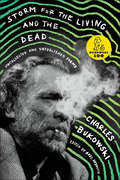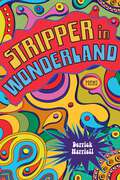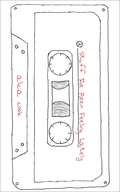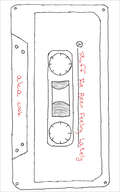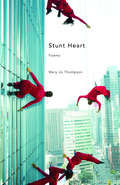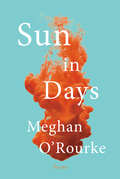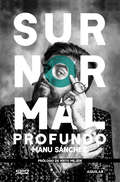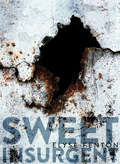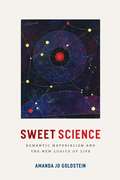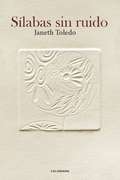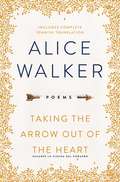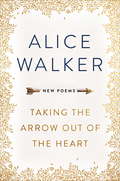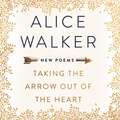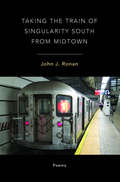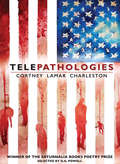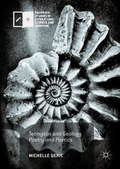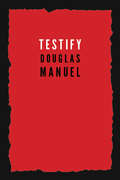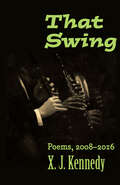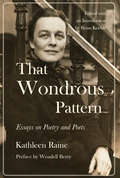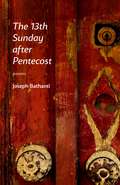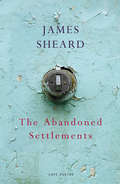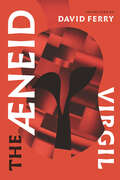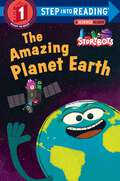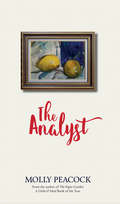- Table View
- List View
Storm for the Living and the Dead: Uncollected and Unpublished Poems
by Charles BukowskiA timeless selection of some of Charles Bukowski’s best unpublished and uncollected poemsCharles Bukowski was a prolific writer who produced countless short stories, novels, and poems that have reached beyond their time and place to speak to generations of readers all over the world. Many of his poems remain little known, material that appeared in small magazines but was never collected, and a large number of them have yet to be published. In Storm for the Living and the Dead, Abel Debritto has curated the very finest of this material—poems from obscure, hard-to-find magazines, as well as from libraries and private collections all over the country—most of which will be new to Bukowski’s readers and some of which has never been seen before. In doing so, Debritto has captured the essence of Bukowski’s inimitable poetic style—tough and hilarious but ringing with humanity. Storm for the Living and the Dead is a gift for any devotee of the Dirty Old Man of American letters.
Stripper in Wonderland: Poems (Southern Messenger Poets)
by Derrick HarriellThe percussive poems of Stripper in Wonderland move from birth to death, funk to hip-hop, and racism to religion as Derrick Harriell explores the life of a modern black man transplanted from the American Midwest to the Deep South.Harriell summons the ghosts of the past as he deals with the realities of the present. He carefully winds images and words together to produce powerful, often graphic, poems that inform our view of one another as they punch through our assumptions.
Stuff I've Been Feeling Lately
by Alicia CookStructured like an old-school mix-tape, Stuff I've Been Feeling Lately is Alicia Cook's lyric message to anyone who has dealt with addiction. <P><P> "Side A" touches on all aspects of the human condition: life, death, love, trauma, and growth. <P>"Side B" contains haunting black-out remixes of those poems.
Stuff I've Been Feeling Lately
by Alicia CookStructured like an old-school mix-tape, Stuff I've Been Feeling Lately is Alicia Cook's lyric message to anyone who has dealt with addiction. "Side A" touches on all aspects of the human condition: life, death, love, trauma, and growth. "Side B" contains haunting black-out remixes of those poems.
Stunt Heart (The Backwaters Prize in Poetry)
by Mary Jo ThompsonIn Stunt Heart, Mary Jo Thompson’s debut collection,a female gaze locates the ironies inside the subjects of marriage and death, loneliness and love, speaking and silence. The title plays on both sick hearts and circus tricks, and appropriately, these poems are direct, personal, and disarmingly emotive. Look at the end of the first poem, “Says Penelope,” where the speaker suddenly veers to “Newsflash: I sleep- / walk.” These stark moments of admission are used to perfection in the centerpiece sonnet series, “Thirteen Months,” the collection’s highlight. Distilled emotion over the illness and death of an estranged husband ranges in tone from the dark humor that compares the marriage to a used car to the elegiac imagery of protecting the family garden from frost. The shock of seeing the deceased in his casket looking like a cross between Clark Gable and Dracula seasons the collection, recurring in ruminations on the various ways a body is prepared at death and the story of a mother who dies while sneezing. Although no one brings back the dead by writing poetry, in Stunt Heart,Thompson revisits them with credible humor and tough dispatches from bedrooms, graveyards, and hospital hallways. Thompson’s Stunt Heart jukes, dodges, and prays while muscling through all manners of demise and in the process reveals how one can turn grief into speech, art into grieving.
Sun in Days: Poems
by Meghan O'RourkeA groundbreaking new collection by a celebrated writer of “ambitious and dynamic poems” (New York Times). From the acclaimed poet and critic Meghan O’Rourke comes a powerful collection about the frailty of the body, the longing for a child, and the philosophical questions raised when the body goes dramatically awry. In formally ambitious poems and lyric essays, Sun in Days gives voice to the experience of illness, the permanence of loss, and invigorating moments of grace. Wresting a recuperative beauty from one’s days, O’Rourke traces an arc from loss and illness to the life force of pregnancy and motherhood. Along the way, she investigates a newfound existential awareness of all that vanishes. This is O’Rourke’s most ambitious book to date: unsentimental yet deeply felt, and characterized by the lyric precision and force of observation for which her work is known. From “Idiopathic Illness” What can be said? I came w/o a warranty, Stripped of me—or me-ish-ness— I was a will in a subpar body. I waxed toward all that waned inside.
Surnormal profundo
by Manu Sánchez<br>como yo te hablo, <br> como yo te hablo, <br> convéncete, escolta nen, <br>nadie te hablará, <br> ningú et parlarà, <br> nadie porque yo... <br> Te hablo en un idioma sobrehumano, <br>yo, te cambio «to» las eses por las zetas, <br> yo, me como los finales y las letras, <br> yo, no cambio un «qué teh’quiero» por «t’estimo molt», <br> no pruebo el espetec habiendo salchichón, <br>te digo «quillo», «pisha», «polla», «miarma », <br> yo, te hablo pero tú no entiendes nada, <br> yo, que llevo ya 3.000 años hablando, <br> yo, lo mío es como lo tuyo sin malaje, <br>yo, me quedo sin frenillo por hablarte, <br> yo, te hablo a puro grito y en silencio, <br> yo, si no me entiendes el problema no soy yo.
Sweet Insurgent
by Elyse FentonElyse Fenton’s follow-up to her critically acclaimed first book furthers the great themes of women in wartime. From intimate meditations on birthing, motherhood, and parenting in a time of war, to its explorations of the frank and grave matters surrounding a life lived while a lover is off fighting a war, these lush poems of the human interior always put themselves in harm’s way, for there the poet finds the truest meanings. Sweet Insurgent, winner of the Alice Fay di Castagnola Prize, is a book of vivid and crushing lyric poems, each one landing like a mortar to the earth.
Sweet Science: Romantic Materialism and the New Logics of Life
by Amanda Jo GoldsteinToday we do not expect poems to carry scientifically valid information. But it was not always so. In Sweet Science, Amanda Jo Goldstein returns to the beginnings of the division of labor between literature and science to recover a tradition of Romantic life writing for which poetry was a privileged technique of empirical inquiry. Goldstein puts apparently literary projects, such as William Blake’s poetry of embryogenesis, Goethe’s journals On Morphology, and Percy Shelley’s “poetry of life,” back into conversation with the openly poetic life sciences of Erasmus Darwin, J. G. Herder, Jean-Baptiste Lamarck, and Étienne Geoffroy Saint-Hilaire. Such poetic sciences, Goldstein argues, share in reviving Lucretius’s De rerum natura to advance a view of biological life as neither self-organized nor autonomous, but rather dependent on the collaborative and symbolic processes that give it viable and recognizable form. They summon De rerum natura for a logic of life resistant to the vitalist stress on self-authorizing power and to make a monumental case for poetry’s role in the perception and communication of empirical realities. The first dedicated study of this mortal and materialist dimension of Romantic biopoetics, Sweet Science opens a through-line between Enlightenment materialisms of nature and Marx’s coming historical materialism.
Sílabas sin ruido
by Janeth ToledoUn poemario que surge desde el verbo que se hace en silencio, en íntima comunión con su cuerpo y la naturaleza. Desde hace más de veinte años y hasta el día de hoy -cuando al parecer ha fijado ya su residencia definitiva en la tierra- Janeth Toledo ha vivido en distintos parajes del Valle de los Chillos en los cuales ha afinado su percepción y comprensión de la naturaleza. En ese diálogo con el paisaje -entendido como espacio de meditación y reflexión- Janeth encuentra buena parte de los elementos con los que construye sus poemas: sutiles visiones del entorno en las que proyecta sus emociones y su memoria, o al revés: el caudal de su experiencia afectiva transformando y resignificando el paisaje que habita. «Después de la lloviznatodo campo es más verdebrilla la hojay en su nervadura late febrilel pulso de la vida.» En el filón creativo de los poetas románticos, la autora interioriza la naturaleza, la hace pasar por su cuerpo y sus afectos para devolverla al lector trastocada, en forma de imágenes reveladoras, elocuentes en su laconismo y en su sigilo. Si sus palabras «nacen en la opacidad», su voz ruge «en el primer aliento / de las valvas». Esta hermosa imagen inaugural acaso resuma su dicción y su verdad: traducir el grito del cuerpo a una lengua de secretos y murmullos, decir la vida a través de las pequeñas hendiduras del cuerpo, aquellas que abren el sexo y los sentidos, nuestros más precisos instrumentos de conocimiento y de comunicación. Con este pequeño, íntimo, entrañable poemario, Janeth Toledo debuta en la poesía para cantar en voz baja y eficaz las profundas certezas e incertidumbres que no invaden ahora mismo. Hay que apegarla oreja para escuchar su rugido. Cristóbal Zapata
Taking the Arrow Out of the Heart
by Alice WalkerAlice Walker, author of the National Book Award and Pulitzer Prize-winning The Color Purple—“an American novel of permanent importance” (San Francisco Chronicle)—crafts a bilingual collection that is both playfully imaginative and intensely moving.Presented in both English and Spanish, Alice Walker shares a timely collection of nearly seventy works of passionate and powerful poetry that bears witness to our troubled times, while also chronicling a life well-lived. From poems of painful self-inquiry, to celebrating the simple beauty of baking frittatas, Walker offers us a window into her magical, at times difficult, and liberating world of activism, love, hope and, above all, gratitude. Whether she’s urging us to preserve an urban paradise or behold the delicate necessity of beauty to the spirit, Walker encourages us to honor the divine that lives inside all of us and brings her legendary free verse to the page once again, demonstrating that she remains a revolutionary poet and an inspiration to generations of fans.
Taking the Arrow out of the Heart
by Alice WalkerAlice Walker, author of the Pulitzer Prize-winning modern classic, The Color Purple, returns with a poetry collection that is both playfully imaginative and intensely moving. In Taking the Arrow Out of the Heart, Alice Walker examines our troubled times, while also chronicling a life well-lived. From poems of painful self-inquiry, to celebrating the simple beauty of everyday life, Walker offers us a window into her magical, at times difficult, and liberating world of activism, love, hope and, above all, gratitude. Whether she's urging us to preserve an urban paradise or behold exploring the necessity of beauty to the spirit, Walker demonstrates that she remains a revolutionary poet and an inspiration to generations of fans.
Taking the Arrow out of the Heart
by Alice WalkerAlice Walker, author of the Pulitzer Prize-winning modern classic, The Color Purple, returns with a poetry collection that is both playfully imaginative and intensely moving. In Taking the Arrow Out of the Heart, Alice Walker examines our troubled times, while also chronicling a life well-lived. From poems of painful self-inquiry, to celebrating the simple beauty of everyday life, Walker offers us a window into her magical, at times difficult, and liberating world of activism, love, hope and, above all, gratitude. Whether she's urging us to preserve an urban paradise or behold exploring the necessity of beauty to the spirit, Walker demonstrates that she remains a revolutionary poet and an inspiration to generations of fans.
Taking the Arrow out of the Heart
by Alice WalkerAlice Walker, author of the Pulitzer Prize-winning modern classic, The Color Purple, returns with a poetry collection that is both playfully imaginative and intensely moving. In Taking the Arrow Out of the Heart, Alice Walker examines our troubled times, while also chronicling a life well-lived. From poems of painful self-inquiry, to celebrating the simple beauty of everyday life, Walker offers us a window into her magical, at times difficult, and liberating world of activism, love, hope and, above all, gratitude. Whether she's urging us to preserve an urban paradise or behold exploring the necessity of beauty to the spirit, Walker demonstrates that she remains a revolutionary poet and an inspiration to generations of fans.(p) Simon & Schusters US 2018
Taking the Train of Singularity South from Midtown
by John J. RonanThe general theme of this book, and a number of its individual poems, is that love and language create community. There is little self- reference and confession. Set in Gloucester, New York, or Paris, in Panama or Newtown, the poems come from a commitment to civic poetry, a poetry of social place and witness. Civic poetry is poems written for the public on community topics; poetry accessible to an attentive, general audience. And since it is often meant to be read in public, civic poetry relies on sound and familiar forms: rhyming tricks, assonance, consonance, regular rhythms, refrain and stanza, couplets, etc. And of course, civic poetry, like all poetry, is insightful, well-crafted and fresh, never talks down, and is never watered down.Besides accessibility, sound, rhythm, and freshness, there is another necessary ingredient in civic poetry: hope. Not innocent or immature hope, nothing naive. It may be a battered hope, even diminished, but is not cowed or faint, remains brassy, unabashed. Civic poetry makes no apologies for believing in our stressed and distorted, but wonderful national experiment.
Telepathologies
by Cortney Lamar CharlestonCortney Lamar Charleston’s debut collection looks unflinchingly at the state of race in 21st Century America. Today, as much as ever before, the black body is the battleground on which war is being waged in our inner cities, and Charleston bares witness with fear, anger, and glimpses of hope. He watches the injustice on T.V., experiences it firsthand at simple traffic stops, and even gives voice to those like Eric Garner and Sandra Bland who no longer can. Telepathologies is a shout in the darkness, a plea for sanity in an age of insantiy, and an urgent call to action.
Tennyson and Geology: Poetry and Poetics (Palgrave Studies in Literature, Science and Medicine)
by Michelle GericThis book offers new interpretations of Tennyson's major poems along-side contemporary geology, and specifically Charles Lyell's Principles of Geology (1830-3). Employing various approaches - from close readings of both the poetic and geological texts, historical contextualisation and the application of Bakhtin's concept of dialogism - the book demonstrates not only the significance of geology for Tennyson's poetry, but the vital import of Tennyson's poetics in explicating the implications of geology for the nineteenth century and beyond. Gender ideologies in The Princess (1847) are read via High Miller's geology, while the writings of Lyell and other contemporary geologist, comparative anatomists and language theorists are examined along-side In Memoriam (1851) and Maud (1855). The book argues that Tennyson's experimentation with Lyell's geology produced a remarkable 'uniformitarian' poetics that is best understood via Bakhtinian theory; a poetics that reveals the seminal role methodologies in geology played in the development of divisions between science and culture, and that also, quite profoundly, anticipates the crisis in language later associated with the linguistic turn of the twentieth century.
Testify
by Douglas ManuelThis award-winning debut book of poetry examines race, masculinity, religion, class, and the African American experience in the American Midwest.A book of elegiac ambivalence, Testify&’s speaker often finds himself trapped between received binaries: black and white, ghetto and suburban, atheism and Catholicism. In many ways, this work is a Bildungsroman detailing the maturation of a black man raised in the crack-laden 1980s, with hip-hop, jazz, and blues as its soundtrack. Rendered with keen attention to the economic decline of the Midwest due to the departure of the automotive industry, this book portrays the speaker wrestling with his city&’s demise, family relationships, interracial love, and notions of black masculinity. Never letting anyone, including the speaker, off the hook, Testify refuses sentimentality and didacticism and dwells in a space of uncertainty, where meaning and identity are messy, complicated, and multivalent.&“Manuel charts the raw emotional complexities and the impossible daily reckonings that confront a young black man coming of age today in America. . . . Each powerful testimony in this collection stands as evidence of an eloquent and dramatic new voice in American poetry.&” ―David St. John, author of The Auroras and Study for the World&’s Body &“These potent poems testify to those ambivalent moments that might rend or right us, as when an interracial couple drive past a truck with a Confederate flag painted on its back windshield and from which a little boy turns to smile and wave: his &‘blond hair // split down the middle like a Bible / left open to the Book of Psalms.&’&” ―Anna Journey, author of The Atheist Wore Goat Silk
That Swing: Poems, 2008–2016 (Johns Hopkins: Poetry and Fiction)
by X. J. KennedyThe latest rollicking verse from award-winning poet X. J. Kennedy.In this, his ninth book of poetry, lyric master X. J. Kennedy regales his readers with engaging rhythm fittingly signaled by the book’s title, which echoes Duke Ellington’s jazz classic "It Don’t Mean a Thing (If It Ain’t Got That Swing)." Kennedy’s poems, infused with verve and surprise, are by turns irresistibly funny and sharply insightful about life in America.Some poems are personal recollections of childhood and growing up, as in "My Mother Consigns to the Flames My Trove of Comic Books." "Thomas Hardy’s Obsequies" tells the bizarre true account of the literary giant’s burial. Other poems portray memorable characters, from Jane Austen ("Jane Austen Drives to Alton in Her Donkey Trap") to a giant land tortoise ("Lonesome George") to a slow-witted man hired to cook for a nudist colony ("Pudge Wescott"). Kennedy is a storyteller of the first order, relating tales of travel to far-reaching places, from the Galápagos Islands and Tiananmen Square to the hectic back streets of Bamako, Mali. This wise and clever book is rounded out with adept translations of work by Charles Baudelaire, Stéphane Mallarmé, Arthur Rimbaud, and others.
That Wondrous Pattern: Essays on Poetry and Poets
by Kathleen Raine“There is no exaggeration in pointing out that these essays are addressed to the soul of the reader. They are not academic exercises in erudition as a contribution to ‘Eng. Lit.’” —from the introduction by Brian Keeble Kathleen Raine was one of the greatest British poets of the last century. Born to a deeply literary and spiritual household, she went on to study at Cambridge, where she met Jacob Bronowski, William Empson, and Malcolm Lowry. A dedicated neoPlatonist, she studied and presented the works of Thomas Taylor and wrote seminal books on William Blake. With Keith Critchlow, Brian Keeble, and Philip Sherrard, she founded, in 1981, the Temenos Academy of Integral Studies, its journal Temenos, and, later, the Temenos Academy Review. HRH The Prince of Wales became the patron of the academy in 1997.For our new selection, That Wondrous Pattern, Raine offers sixteen essays that range from “The Inner Journey of the Poet” and “What Is Man?” to essays on Blake, Wordsworth, Hopkins, Yeats, Eliot, and several others. The centerpiece, “What Is the Use of Poetry?”, is a rigorous defense of the great art. Editor Brian Keeble himself contributes a fascinating introduction to Raine’s work, and Wendell Berry, a colleague and friend of hers, offers a preface.All who spend time in the presence of this wonderful writer will leave newly entranced with the art and use of the beautiful, convinced that “it is only in moments when we transcend ourselves that we can know anything of value.
The 13th Sunday after Pentecost: Poems (Voices of the South)
by Joseph BathantiIn The 13th Sunday after Pentecost, Joseph Bathanti offers poems that delve deep into a life reimagined through a mythologized past. Moving from his childhood to the present, weaving through the Italian immigrant streets of Pittsburgh, Pennsylvania, to his parochial school, from the ballpark to church and home again, these contemplative poems present a situation unique to the poet but familiar to us all. As Bathanti recalls the joys, struggles, and confusion of his formative years in the late fifties and into the sixties, he gains a deeper understanding of the often surreal, always paradoxical world around him. He explores the perceived injustices of childhood, observes the mysteries of religious rituals, and examines the complex emotions families experience as children grow up and parents grow old. These poems divulge an eventful life, compelling us to reflect on our own as we confront a world of wonder and uncertainty. Across the strike zone swoops a dove, maybe an angel. You’re in Pittsburgh, March; it’s snowing. All week you’ve seen angels; everyone’s tired, proclaiming even horrid things angels, intimating miracles. Johnson’s pitch obliterates the bird— a hail of feathers and dander, as if inside a tiny bomb detonated. Like a cartoon. Thoroughly unbelievable. Around you, people are dying. But you ignore it. You laugh at the massacred dove. It’s not funny, but you laugh. You could cry, rip your hair out, your clothes off, crash through the seventhfloor window into the slushy black streets of the city. It’s funny because it’s not. —from “Angels”
The Abandoned Settlements
by James SheardShortlisted for the 2017 T. S. Eliot PrizePBS Autumn RecommendationThe poems in James Sheard’s remarkable third book are about love and leaving, of how the rift of departure brings on a kind of haunting – of the people involved and the places where they lived – an emotional trace of departed lives and loves. This is what these poems are: the scars of separation, the spoors of desire. Sheard writes powerfully about loss, about how the vestiges of significance, of sensual heat, are retained by structures – in ghost towns, war-zones, deserted villages or resorts – but also by the human body and memory: ‘for love exists, and then is ruined, and then persists.’These are poems about permanence and fragility, of being uncertain whether the house you live in is a shell, or if you have become a shell by living there – whether emptiness means loss and abandonment or a clean start and a new beginning. But these are also poems full of the ache of desire, the tart, lingering smell of sex: poems shaped by longing.James Sheard is one of Britain’s most assured and precise lyric poets, and his third collection brings all his considerable strengths to poems as accurate and strange as thermal images.
The Aeneid
by David Ferry VirgilIn 2012, David Ferry capped a long career as a poet with a National Book Award, given in honor of his book Bewilderment: New Poems and Translations. But he had no interest in resting on his laurels. In fact, he was in the middle of the most ambitious poetic project of his life. Six years earlier, at age eighty-two, he had embarked on a complete translation of one of the foundational works of Western culture: Virgil’s Aeneid. Now we have it, and it is a glorious thing. Ferry has long been known as perhaps the foremost contemporary translator of Latin poetry, his translations of Virgil’s Eclogues and Georgics having established themselves as much-admired standards. He brings to the Aeneid the same genius, rendering Virgil’s formal, metrical lines into an English that is familiar and alive. Yet in doing so, he surrenders none of the feel of the ancient world that resonates throughout the poem and gives it the power that has drawn readers to it for centuries. In Ferry’s hands, the Aeneid becomes once more a lively, dramatic poem of daring and adventure, of love and loss, devotion and death. Never before have Virgil’s twin gifts of poetic language and fleet storytelling been presented so powerfully for English-language readers. Ferry’s Aeneid will be a landmark, a gift to longtime lovers of Virgil and the perfect entry point for new readers. “I sing of arms and the man . . . ” The epic journey, from the fall of Troy to the founding of Rome, is ready to begin. Join us.
The Amazing Planet Earth (Step into Reading)
by StorybotsThe wacky robots from the award-winning apps, videos, and Netflix show, Ask the StoryBots, now star in their own early readers. This one is about our little corner of the solar system!Fans of the StoryBots will recognize the colorful art from their popular outer-space video, &“A Beautiful, Beautiful World&” (The Earth Song), on YouTube. There are eight planets in our solar system, but the most beautiful is the one we call home. This rhyming Step 1 Science Reader will entertain while imparting simple facts about everyone&’s favorite planet. Step 1 Readers feature big type and easy words for children who know the alphabet and are eager to begin reading. Rhyme and rhythmic text paired with picture clues help children decode the story.Accolades for the StoryBots digital media: Appy Award for Best Book AppTeacher's Choice Award Editor&’s Choice—Children&’s Technology Review Family Choice Award Parents&’ Choice AwardCynopsis Kids !magination Award for best educational mobile app
The Analyst
by Molly PeacockWhen a psychoanalyst became a painter after surviving a stroke, her longtime patient, distinguished and beloved poet Molly Peacock, took up a unique task. The Analyst is a new, visceral, twenty-first century "in memoriam" of ambiguous loss in which Peacock brilliantly tells the story of a decades-long patient-therapist relationship that now reverses and continues to evolve. Peacock invigorates the notion of poetry as word-painting: A tapestry of images, from a red enameled steamer on a black stove to Tibetan monks funneling glowing sand into a painting, create the backdrop for her quest to define identity. From "In Our Unexpected Future":. . . for frocks outlast pillars. But feelingsoutlive frocks. The immaterial storms through,a force beyond years (a mere four since youwere nearly felled). It isn't what happened that lasts. Not art, either, but the savory core. What's felt.
